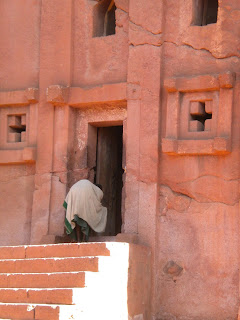
According to the oral tradition, Ethiopia was settled by Ethiopic, the great-grandson of Noah. Ethiopic's son founded the capital of Axum and also a dynasty of rulers that lasted between 52-97 generations. The last and greatest of these monarchs was Queen Makeda who in the 11th century BC owned a fleet of 73 ships and caravan of 520 camels which traded with places as far away as Palestine and Inda. Queen Madeda ruled 31 years outside modern-day Axum which, according to Ethiopians, was know as Sabea.
Early in her rule, it is claimed, the Queen of Sabea (better known to Westerners as the Queen of Sheba) travelled to Jerusalem to visit King Solomon. She brought with her gifts of gold, ivory and Spices and in return she was invited to stay in the palace. According to the Ethiopians, Queen Makeda returned to Ethiopia three years later converted to Judaism and pregnant with Solomon's son, Ibn-al-Malik (Son of the king) whose name later became Menelik. According to traditional history, it is ssaid that when Menelik turned 22 years of age he want to Jerusalem to visit his father. He stayed for three years, learning the Law of Moses. When he returned to Ethiopia, King Solomon sent 1,000 people with Menelink to Ethiopia. On Menelik's return, his mother abdicated the throne in his favor. The Solomonic Dynasty founded by Menelik ruled Ethiopia almost unbroken until 1974 when the 237th monarch, Haile Selassie, was overthrown in the socialist revolution. Most Ethiopians accept this version of history unquestioningly, but it has never been taken very seriously by Western historians.

































